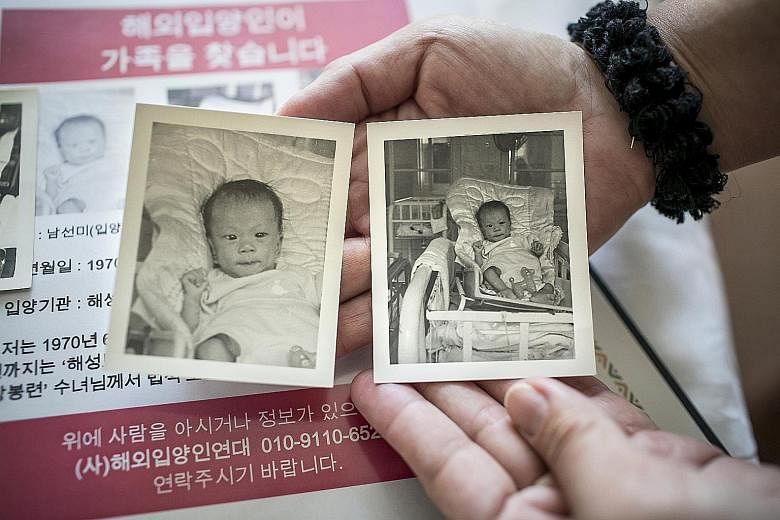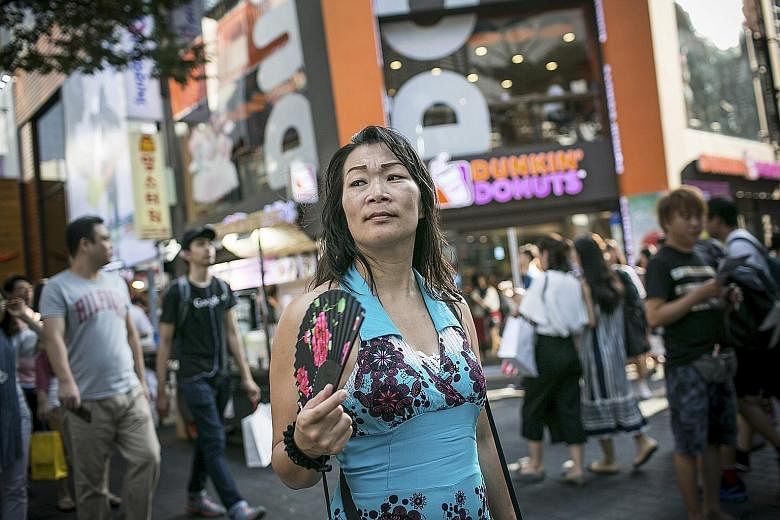SEOUL • Five years ago, Ms Sun Mi Stapel, a claims handler at a Dutch insurance firm, began searching for her South Korean birth family.
She first turned to the Dutch adoption agency that had placed her with her adoptive parents in the Netherlands, where she grew up. Then she tried Korea Social Service, which had handled the Korean side of her adoption. Last year, she obtained her adoption files, but they were missing vital information.
She travelled to Seoul, appearing on a TV show with her baby photos and asking viewers to call a hotline. She registered for a national database for missing people. She distributed fliers in the neighbourhood in Incheon, where she was born, and visited nursing homes and community centres there in hopes of finding someone who knew her parents. No one did.
So on a recent Tuesday afternoon, Ms Stapel, 46, went to a guesthouse for adoptees in Seoul, where a volunteer rubbed the inside of her cheek with a cotton swab and shipped it to a lab in Texas, where her DNA will be analysed and posted to a website that scans submitted samples for genetic matches.
The result could link her to her birth family and fill in some blanks of her personal history. "I want to know the simple things. When is my real date of birth? Who is my father? Who is my mother?" she said.
Many South Korean adoptees who have the same questions are turning to DNA testing to circumvent what has long been a tortuous and often fruitless process.
For years, South Korea was the world's leading baby exporter, with stigma always being a factor in its international adoptions, which began in the mid-1950s. The children of Korean women and United States servicemen were ostracised for their mixed racial heritage, and the shame of single parenthood fuelled abandonments, while the poor local economy favoured international adoption. Since the 1950s, the country has sent about 200,000 children abroad for adoption, including about 150,000 to the US.
For many adoptees, DNA testing offers a way around the bureaucratic hurdles and flawed records.
Ms Stapel was one of a few dozen adoptees who took free DNA tests made available in Seoul this month during the International Korean Adoptee Associations Gathering.
The DNA testing movement has been largely financed by Mr Thomas Park Clement, a Korean adoptee who now lives in the US. A scientist who founded Mectra Labs, a medical manufacturing company, he has pledged to spend US$1 million (S$1.4 million) on DNA kits to give away.
"I have throughout the years experienced so many of my fellow Korean adoptees' frustrations with birth relative searches," he said in a recent interview. "DNA is shortcutting the search process and bringing all parties in direct communication with each other."
He has donated 2,550 kits to Korean adoptees and Korean War veterans in the US. Some of the veterans are the fathers of the first wave of South Korea's adoptees. He has also given 450 test kits to 325Kamra, a volunteer group started last year, to distribute in South Korea.
When testing works, it is remarkably efficient. This month, 325Kamra announced its first match between a Korean birth mother and a US adoptee. Within 48 hours, the adoptee, Ms Kyung Eun Davidson, 33, of Everett, Washington, was speaking to her mother for the first time in 30 years. "It's been an amazing, crazy and wonderful experience," she told The Korea Herald.
Adoptees are not the only ones placing their hopes in DNA tests.
Last month, Mr Song Chang Sook, 89, travelled 325km from Busan to take a DNA test in Seoul. He was searching for the three sons he relinquished when his wife died of typhoid fever in 1970. The adoption agency was prohibited from disclosing personal information about the three boys. The 2012 adoption law that gives adoptees the right to petition for their birth records offers no such benefit to the parents.
NEW YORK TIMES


